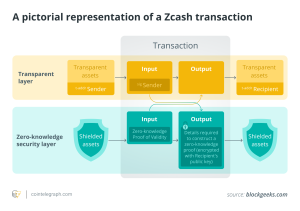MetaMask vs Coinbase Wallet: A Side-by-Side Comparison
6 min read
MetaMask and Coinbase are two of the most popular cryptocurrency wallets available today. While both wallets offer secure storage and easy access to your digital assets, there are some key differences between the two that you should consider before choosing which one is right for you.
Learn the differences between the popular cryptocurrency wallets, MetaMask and Coinbase. Find out which one is right for you based on features, security, and compatibility with different cryptocurrencies.
MetaMask Wallet Overview
MetaMask is a digital wallet that allows users to store, manage, and interact with digital assets on the Ethereum blockchain. It is a browser extension that integrates seamlessly with popular web browsers like Chrome, Firefox, and Brave, and it provides a secure and convenient way to manage Ether (ETH) and other ERC-20 tokens.
Pros
- Security: It offers increased security for managing digital assets. The extension uses a combination of password protection, seed phrases, and secure key storage to keep your assets safe, and it also allows you to set up multiple accounts with different levels of access.
- Versatility: In addition to serving as a digital wallet, MetaMask also allows users to access and interact with decentralized applications (DApps) directly through their web browser. This makes it a convenient and easy way to access and use these types of applications.
Cons
- It has the potential for phishing attacks, as hackers may attempt to trick users into revealing their login information or seed phrases. It is important for users to be cautious and verify the authenticity of any requests for their login information.
- MetaMask is a browser extension, which means it is only compatible with certain web browsers. Users may need to switch to a compatible browser in order to use the extension, which can be inconvenient.
Coinbase Wallet
Coinbase Wallet is a mobile cryptocurrency wallet developed by Coinbase, Inc., a company that operates a cryptocurrency exchange of the same name. The wallet allows users to store, receive, and transfer various cryptocurrencies, including Bitcoin, Bitcoin Cash, Ethereum, Ethereum Classic, and Litecoin.
Pros
- Security: Coinbase Wallet uses multiple layers of security to protect user funds, including secure storage of private keys and support for hardware wallets like the Trezor and Ledger Nano.
- Ease of use: Coinbase Wallet has a user-friendly interface that makes it easy for beginners to use.
- Wide range of supported cryptocurrencies: In addition to the four cryptocurrencies mentioned above, Coinbase Wallet also supports other popular cryptocurrencies like XRP, Chainlink, and more.
- Integration with Coinbase exchange: Coinbase Wallet users can easily buy and sell cryptocurrencies using the Coinbase exchange, which is integrated into the wallet.
Cons
- Fees: Coinbase Wallet charges fees for certain types of transactions, such as buying and selling cryptocurrencies on the Coinbase exchange. These fees can vary depending on the amount being traded and the payment method used.
- Limited control over private keys: As a custodial wallet, Coinbase Wallet holds the private keys for its users. This means that users do not have complete control over their funds, as they do with non-custodial wallets.
- Centralized nature: As a centralized service, Coinbase Wallet is subject to the risk of security breaches and downtime, which could potentially result in the loss of user funds.
Head-to-Head Comparison of Metamask vs Coinbase
- Type of asset each supports: MetaMask is a browser extension that allows you to interact with the Ethereum blockchain, which means it can store and manage Ether (ETH) and other ERC-20 tokens. Coinbase, on the other hand, is a more traditional cryptocurrency exchange that supports a wider range of assets, including Bitcoin (BTC), Bitcoin Cash (BCH), Ethereum (ETH), and Litecoin (LTC).
- Handling transactions: MetaMask allows you to send and receive transactions directly through the extension, while Coinbase requires you to transfer your assets to an external wallet or exchange in order to make a trade. This can be a bit more inconvenient, but it also means that Coinbase has more control over the security of your assets.
- Security: Both MetaMask and Coinbase offer high levels of protection for your digital assets. MetaMask uses a combination of password protection, seed phrases, and secure key storage to keep your assets safe, while Coinbase employs a number of security measures including two-factor authentication, encrypted storage, and insurance for assets held on the platform.
- One area where MetaMask stands out is its compatibility with decentralized applications (DApps). Since MetaMask is a browser extension, it allows you to interact with DApps directly through your browser, making it a convenient and easy way to access and use these types of applications. Coinbase, on the other hand, does not currently support DApps.
So Which Wallet is Right For You?
It’s difficult to say definitively which wallet is “best” between Coinbase and MetaMask, as the decision will depend on an individual’s specific needs and priorities. Here are some points to consider when deciding between the two:
- Security: Both Coinbase and MetaMask offer multiple layers of security to protect user funds. Coinbase Wallet is a custodial wallet, which means that it holds private keys for its users. This can be seen as a security advantage, as Coinbase’s security measures are designed to protect against the risk of private key loss or theft. MetaMask is a non-custodial wallet, which means that users are responsible for their own private keys. This can be seen as a security advantage, as users have complete control over their funds, but it also means that they are responsible for keeping their keys safe.
- Ease of use: Coinbase Wallet is generally considered to be more user-friendly than MetaMask, particularly for beginners. MetaMask has a more complex interface and may require a greater learning curve for some users.
- Supported cryptocurrencies: Coinbase Wallet supports a wide range of cryptocurrencies, including Bitcoin, Bitcoin Cash, Ethereum, Ethereum Classic, and Litecoin. MetaMask is primarily an Ethereum wallet, but it also supports some other Ethereum-based tokens.
- Integration with other platforms: MetaMask is a browser extension that allows users to interact with the Ethereum blockchain and decentralized applications (dApps) from their web browser. It can be used with Chrome, Firefox, and Brave. Coinbase Wallet is a standalone mobile app that does not require a browser extension.
Ultimately, the choice between Coinbase and MetaMask will depend on an individual’s specific needs and preferences. If you are looking for a user-friendly, secure way to store and use a wide range of cryptocurrencies and you’re willing to trade off a bit of convenience for added security, Coinbase Wallet may be the better choice. If you are primarily interested in using Ethereum and dApps, and you value the added security and control of a non-custodial wallet, MetaMask may be the better choice.
Is it cheaper to buy ETH on MetaMask or Coinbase?
Whether it is cheaper to buy ETH on MetaMask or Coinbase will depend on a variety of factors, including the current market price of ETH, the fees charged by each platform, and any discounts or promotions that might be available. It’s a good idea to do your own research and compare prices on different platforms before making a decision.
Can you buy crypto on MetaMask?
No, If you want to buy cryptocurrency using MetaMask, you will typically need to first purchase ETH or another supported cryptocurrency on a separate platform, such as a cryptocurrency exchange, and then transfer it to your MetaMask wallet. Once you have deposited cryptocurrency into your MetaMask wallet, you can use it to interact with DApps or send it to other users.
Is Metamask safer than Coinbase?
Both Coinbase and MetaMask are reputable and secure platforms that have implemented a number of measures to protect their users’ cryptocurrency assets. However, they have different security features and are designed to serve different purposes, so it’s difficult to say definitively whether one is safer than the other.
Ultimately, the safety of your cryptocurrency assets depends on a number of factors, including the platform or wallet you are using, the security measures you have in place, and your own personal security practices. It’s a good idea to carefully research and compare the security features of different platforms and choose one that meets your needs and provides the level of security you are comfortable with. It’s also important to follow best practices for securing your cryptocurrency, such as using strong, unique passwords and enabling two-factor authentication whenever possible.






